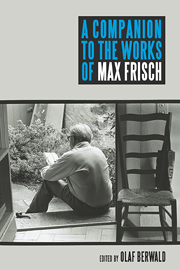Book contents
- Frontmatter
- Contents
- Acknowledgments
- Note on the Abbreviations
- Introduction: Max Frisch in the Twenty-First Century
- 1 Max Frisch's Early Plays
- 2 Spielraum in Max Frisch's Graf Öderland and Don Juan: Transparency as Mode of Performance
- 3 Max Frisch's Biedermann und die Brandstifter and Die große Wut des Philipp Hotz
- 4 Max Frisch's Andorra: Balancing Act between Pattern and Particular
- 5 Eternal Recurrence in Life and Death in Max Frisch's Late Plays
- 6 Max Frisch's Early Fiction
- 7 From Life to Literature: Max Frisch's Tagebücher
- 8 “Writing in order to be a stranger to oneself”: Max Frisch's Stiller
- 9 Cybernetic Flow, Analogy, and Probability in Max Frisch's Homo Faber
- 10 The Ends of Blindness in Max Frisch's Mein Name sei Gantenbein
- 11 Max Frisch's Montauk. Eine Erzählung
- 12 Man, Culture, and Nature in Max Frisch's Der Mensch erscheint im Holozän
- 13 “My life as a man. Everyman”: Max Frisch's Blaubart. Erzählung
- 14 Max Frisch's Essays and Speeches
- Frisch's Major Works
- Select Bibliography
- Notes on the Contributors
- Index
6 - Max Frisch's Early Fiction
Published online by Cambridge University Press: 05 December 2013
- Frontmatter
- Contents
- Acknowledgments
- Note on the Abbreviations
- Introduction: Max Frisch in the Twenty-First Century
- 1 Max Frisch's Early Plays
- 2 Spielraum in Max Frisch's Graf Öderland and Don Juan: Transparency as Mode of Performance
- 3 Max Frisch's Biedermann und die Brandstifter and Die große Wut des Philipp Hotz
- 4 Max Frisch's Andorra: Balancing Act between Pattern and Particular
- 5 Eternal Recurrence in Life and Death in Max Frisch's Late Plays
- 6 Max Frisch's Early Fiction
- 7 From Life to Literature: Max Frisch's Tagebücher
- 8 “Writing in order to be a stranger to oneself”: Max Frisch's Stiller
- 9 Cybernetic Flow, Analogy, and Probability in Max Frisch's Homo Faber
- 10 The Ends of Blindness in Max Frisch's Mein Name sei Gantenbein
- 11 Max Frisch's Montauk. Eine Erzählung
- 12 Man, Culture, and Nature in Max Frisch's Der Mensch erscheint im Holozän
- 13 “My life as a man. Everyman”: Max Frisch's Blaubart. Erzählung
- 14 Max Frisch's Essays and Speeches
- Frisch's Major Works
- Select Bibliography
- Notes on the Contributors
- Index
Summary
Max Frisch was sixteen when he sent his first play, Stahl (Steel), to Max Reinhardt at the Deutsches Theater in Berlin, but when the rejection slip came back from Berlin, the play was consigned to flames. So it was not in 1937, but as early as 1927 that he first voluntarily destroyed some of his own writings. The play had been typed on a rented typewriter, for which Frisch had to use his pocket money. That is perhaps why he was writing in a hurry. However, the rejection from Berlin did not give rise to any sense of resignation or self-doubt; on the contrary, Frisch immediately began writing a new play.
We do not know what exactly he destroyed in 1937 when he went into a forest to consign all his unpublished early manuscripts to the flames. Frisch said that his diaries were among the irretrievably lost texts. They probably also included the play Der Schüler im Himmel (Schoolboy in Heaven), which he wrote in March 1927 for a school performance, and also presumably the three-act play entitled 13. Trupp (Troop 13), which was announced for a family evening of the Free Military Preparatory Training organization (F.M.V.) in 1928. Was the manuscript of Flucht (Escape), which he had sent to his friend Werner Coninx to look at in 1935, among the works destroyed?
- Type
- Chapter
- Information
- A Companion to the Works of Max Frisch , pp. 91 - 104Publisher: Boydell & BrewerPrint publication year: 2013

